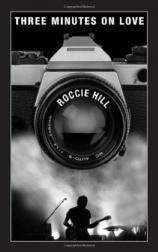Reading Group Guide
Discussion Questions
Three Minutes on Love

1. In Chapter 1, Rosie Kettle describes the California desert where she grew up. “This was our community: fueled by someone else’s water and someone else’s electric power. Even then we were kids of excess, although we never knew it.” Do you believe that the abundance of the post-Eisenhower era significantly impacted the lives of Rosie and her generation?
2. What experiences of their youth caused Rosie and her friends in San Francisco to become the naïve idealists that allowed her to say: “For hours we sat in the wide Sharon Meadow with music around us and the mist moving in from the cold bay at Ocean Beach. We talked of music as though we had invented it, and all of us were certain we would one day be heroes of something.”
3. “I picked up my camera and hid my face behind the lens, holding it still for a moment while the light passed between them, and then I took a picture of those two, musicians who lived in buses and motels together but never once trusted each other.” Of the four housemates in their artistic community (David, Rosie, Peter, Marta), two are introverts and two are extroverts. Discuss which you feel to be in each category, and what leads you to believe that.
4. How does the artistic lifestyle impact those personalities? Or…how do those personalities impact the artistic lifestyle?
5. “Her cheeks were thick and puffy like baby’s cheeks, but ruptured with veins. Between us, the air was medicated with the smell of anise, and she flicked her fingers on the glass. She must have been frightened for a long time, and was now crazy because of it, or was now frightened because she had been crazy since childhood. People like this did not survive in my suburban desert, because there they crushed people who were different.” Rosie describes Sonia in this way. Rosie is surrounded by musicians and filmmakers, several of whom reach their demise in the course of the book, via accident, drugs, alcohol, or madness. What components in Rosie’s life, or in the events in the novel, keep her safe?
6. When Rosie observes the reunion of David and his elderly father, she describes it in this way: “His lashes were so long, framing deep green almond-shaped eyes the exact color of David’s, and some black fire, a luminous blueprint drawn by blood, shone underneath his skin. He reached a hand towards David, his joints knotted with bone disease, but the shape of their fingers was the same, double-helixing as they clasped together.” How does family harm or heal the main characters?
7. “Once I saw an photograph in a magazine of a human embryo at seven weeks. The brain of it shone through its forehead, a cloudy halo of light, deep in the belly of its mother and breathing, the whole luminous mass beating and breathing and that brain driving the first thoughts through a fragile, silk-thin membrane. I always wondered what person had the privilege and the intelligence to take that picture, to intrude on life at its purest and most vulnerable moment.” How would you characterize Rosie’s philosophy of taking photographs? Do you think this description is an honest rendition of her attitude? If so, how do you think she survived a career in the cut-throat music business?
8. Three Minutes on Love is a novel about redemption. What do you believe are the primary elements leading to redemption for David and Rosie? For Peter? For Marta?
Three Minutes on Love
- Publication Date: October 1, 2008
- Hardcover: 288 pages
- Publisher: The Permanent Press
- ISBN-10: 1579621694
- ISBN-13: 9781579621698






